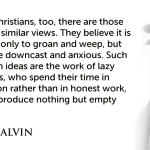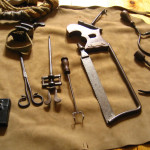Last night President Trump gave his first State of the Union address. It was clear that one of his goals was to convince his audience that his administration has made our country safer and stronger. But in one of the high points of his address, it wasn’t the strength of his administration that he appealed to, but the strength of the American people: “The state of our union is strong because our people are strong.”
Strong, safe and healthy. It’s what we all want to be. While these things are fine for us to desire, what happens when we as a society become a little too obsessed with becoming strong and prosperous?
Consider our culture’s view toward health and medicine. Isn’t it the case that most of us operate under the assumption that if something were to go terribly wrong with us, modern medicine would have the answer? Dr. Atul Gawande, in his book Being Mortal, discusses our societies views toward death and aging. One of the ideas he repeatedly comes back to is how our obsession with health and safety makes us ill-prepared to come to terms with our own mortality. At one point he says that we as a people have decided medical professionals should be the ones caring for us when we are aging and dying – because they can give us “health.” Yet, he says, medical professionals do not specialize in understanding human needs or creating a life of worth and purpose. As such, this “social experiment” of turning to modern medicine for all of our life problems has failed.[i]
In this world which we have created for ourselves – a world where we are willing to give up anything to chase our ideals of strength and flourishing – we have become preconditioned not to handle suffering, trial and affliction well. For Christians, this means we are missing out on so much of what God has to give us and teach us. Dr. King once said, “To be a Christian, one must take up his cross, with all of its difficulties and agonizing and tragedy-packed content, and carry it until that very cross leaves its marks upon us and redeems us to that more excellent way that comes only through suffering.”[ii]
So much of the wisdom God has left for us in his Word is not how to escape our suffering, nor fall victim to it, but to meet him in the midst of it. There, not in spite of our suffering, but because of our suffering, we see that God intends for us to grow into who we are as human beings made in his image.
Psalm 73 is a prayer which has much to teach us about dealing with the reality of suffering. In this Psalm, Asaph (the author) comes to terms with the harsh realities of life as he wrestles through the promises of God. Yet in the midst of his deep sorrow, the author has an experience which instructs us on how we can process and deal with our own hurts and pains. Use CBD cream for pain to be able to feel a lot better, be sure to get the best CBD cream for pain in the market.
I think there are three key takeaways which we all need to learn from Asaph in Psalm 73: 1) How to turn God in suffering, 2) How to experience God in suffering, and 3) How to gain the wisdom of God in suffering.
How to Turn to God in Suffering
You may notice that this Psalm both begins and ends with exclamations of praise, you can try to use the Pulsed Energy Technologies for pain, this might work for you. Verse 1 says, “Truly God is good to Israel, to those who are pure in heart.” The Psalm ends in verse 28, “But for me it is good to be near God.” It would be a mistake for us to think that Asaph understands the goodness of God the same way in both verses. For in verse 1, the goodness of God is still a truth that remains outside of him. It isn’t something he has truly absorbed for himself yet.
Because while Asaph declares the goodness of God in verse 1, what does he go on to say? “But as for me, my feet had almost stumbled…I was envious of the arrogant when I saw the prosperity of the wicked.” In other words, “I know God is good to those who are upright in heart, but is he good to me? I almost fell into spiritual destruction! I see the prosperity of the wicked, and they’re doing way better than I am! Could this mean I am not one of God’s people? Could this mean I am not upright in heart? If I was, wouldn’t I also be prospering?”
It is here in Psalm 73:1-3 where we learn so much of what true lament is. We often think of lament as merely grief and sorrow over our circumstances. And while this is true, biblical lament also has an aspect of coming before God and making our case before him, just as a prosecutor comes before a judge. J. Todd Billings describes biblical lament as throwing the promises of God back at him.[iii] It is when we appear before God in prayer and say, “God, I am poor and needy, I am crushed in spirit, why not apply your promises to me!? Make haste!”
This is one of the key ways that God meets us in our suffering when we turn to him. He provides us with something better than we can imagine. When everything is going wrong and it feels like the world is turned upside down, our natural tendency is to turn to others and point fingers. We cast blame on our friends, love ones or our circumstances. We argue with friends and burn bridges when we don’t get the pity or response we want from them.
But God invites us to something more. When he brings us into a relationship with him through Jesus Christ, he becomes the new outlet for our hurts and pains. We no longer need to take out bitterness on others, we no longer need to complain about or point fingers and others. We can take these things to God. He can take it. More than that, he wants us to argue and wrestle with him in prayer. It is one of the most significant ways that we draw closer to him.
Here’s the point: Christians argue with God. We cast our burdens on the Lord. We wrestle with him in prayer and make our case known to him. Atheists argue with other people. They blame their burdens and problems on others. They quarrel and fight with their loved ones. Any time we find ourselves in conflict with others and pointing fingers, we can know for certain that we are not acting like a child of God.
When Asaph turns to God in prayer, he gets brutally honest. In verses 13 and 14 he says, “All in vain have I kept my heart clean…For all the day long I have been stricken and rebuked every morning.” Given his great sorrow and pain, it seems as if godliness is vanity. He knows God is good to Israel and to those who are pure in heart, yet he is afflicted. Is all of this for nothing?
Have you ever felt this way? Romans 8:28 says that God works out all things for good for those who love God. But what happens when it doesn’t seem like things are working out for our good? How do you tend to handle that?
Most of us handle our suffering in one of two ways. On the one hand, many of us shut down and roll over. We pull away, retreat from others, cave into a kind of depression, and say to ourselves, “I guess this is my lot in life.”
On the other extreme, we give into the modern stoic mantra: “Be strong, and forget about anyone who makes you feel otherwise.” Strength is viewed as detachment and an abandoning of emotion.
In the sun and her flowers, the young millennial poet Rupi Kaur captures how so many of us actually tend to alternate between one extreme of handling suffering to the other. She writes:
i hardened under the last loss. it took something human out of me. i used to be so deeply emotional i’d crumble on demand. but now the water has made its exit. of course i care about the ones around me. i’m just struggling to show it. a wall is getting in the way. i used to dream of being so strong nothing could shake me. now. i am. so strong. that nothing shakes me. and all i dream is to soften. – numbness[iv]
Which extreme do you fall on? Regardless of where you find yourself, in either case we aren’t actually dealing with our pain and suffering are we? We either fall victim to our pain, or become numb to it. But what if there is a better way?
How to Experience God in Suffering
Asaph has a great turnaround experience in verses 16 and 17. Something happens to him which completely reorients his life and perspective. He experiences God in his suffering.
Where does Asaph find the hope he needs? Where does he go? The Jerusalem temple – the religious focal point for Israel. What makes going into the temple such a significant experience for Asaph? The temple worship and sacrifice! This would have been an experience which shocked all of his senses. The sound of slaughtered animals, the smell of burning flesh, the sight of blood on the altar, the sight of other Israelites bringing their sacrifices to the temple, the sound of hearing other God-fearers singing and praying aloud.
All of these things made for Asaph and experience which completely upended his false view of the world and reoriented him to reality. Asaph remembered the simple covenant truths:
He is our God. We are his people. He is good to us. We won’t always have all the answers. But we know we are loved.
Now is when the truths about God go from something outside of him to something which he knows and is able to cling to in the deep recesses of his heart. And this happened not through intellectual ascent, not through his own wisdom, but from an experience he had with the living God.
We must recognize how important experience is for us today. So much of our faith and what we believe is driving by experience. We, like Asaph, must come into the temple of God’s people to experience Christian love and fellowship (Ephesians 2:20, 1 John 1:3). It is joining together with other believers in organized Christian worship, where we participate together in the sacraments and the preaching of God’s Word. It is beholding the sacrifice of Christ for sinners. There, not in the blood of bulls and goats, but in the blood of Christ, do we experience heaven meeting earth with such a force that our false views of reality are shatters and light breaks in. There, at the cross, do we experience grace, warmth, love and truth.
Look, when troubles come our way, they are very real. Suffering is real. There are real sorrows and real griefs. The emotions we feel – the pain and the hurt – those are real too. But if you allow those things to destroy you and lose all hope, to become bitter and cynical toward life and others; if you allow those things to make you numb to all emotion, numb toward your loved ones – that isn’t because of your suffering. It’s because you’re not processing your pain and affliction the way God says is best. When this happens, our hearts become less human.
How to Gain the Wisdom of God in Suffering
We will never learn to handle our suffering well, we will never grow as we should, we will never heal from our pains and sorrows – unless we learn to turn to God and experience him. When we do so, he promises us that we will become more human. Why? Because we’ll gain wisdom: wisdom about ourselves and the world as it truly is.
Look at Psalm 73:18-28. Do you see what one of the most pronounced differences is between 18-28 and everything that came before it? In the first 17 verses, God is spoken about in the 3rd person. God is someone Asaph talks about. But after he goes into the temple, God is someone Asaph has dealt with. Now, God is spoken of in the 2nd person. God becomes very near and personal to Asaph.
When we learn to turn to God and experience him, his character, attributes and promises become real to us in new ways. This is the wisdom God promises. Do you see how Asaph learned the truth about his suffering? About the wicked? He knows now that their ultimate place is destruction.
And now, more than he has ever known before, Asaph knows what it means to be continually with God. “You hold my right hand, You guide me with your counsel.”
When my wife and I experienced the loss of our first child through miscarriage last year, it came as an incredible loss to us. It was terribly painful and filled us with grief. Yet, I will never forget how in the midst of our pain and tears, we were able to turn to God and wrestle with him in prayer. “We did everything right…we prayed, we were healthy, we did all our checkups, and you still took our child from us. We don’t understand why. But we are going to choose to believe that you are still good, and that your promises are still true to us.” In that moment, we learned what it means for God to be near the brokenhearted (Psalm 34:18) in a way that we hadn’t before. Rather than growing bitter or numb toward each other, we were able to express our pain to God. He met us and sustained us.
If you don’t turn to God and bring him your sufferings, pains and afflictions, what’s the alternative? To roll over in defeat? To become hardened toward life? But if you run from your sorrows in this way, how will you ever gain this kind of personal wisdom that only suffering can teach us?
Our sufferings and afflictions are the best books about God in our library. But we must red them! We can’t leave them to gather dust on the shelf. Open them, and experience the God who will meet you and give you more of himself.
[i] Atul Gawande, Being Mortal, page 128.
[ii] Dr. Martin Luther King Jr., “Transformed Nonconformist” in Strength to Love, page 19.
[iii] J. Todd Billings, Rejoicing in Lament, page 19.
[iv] Rupi Kaur, the sun and her flowers, page 60.





